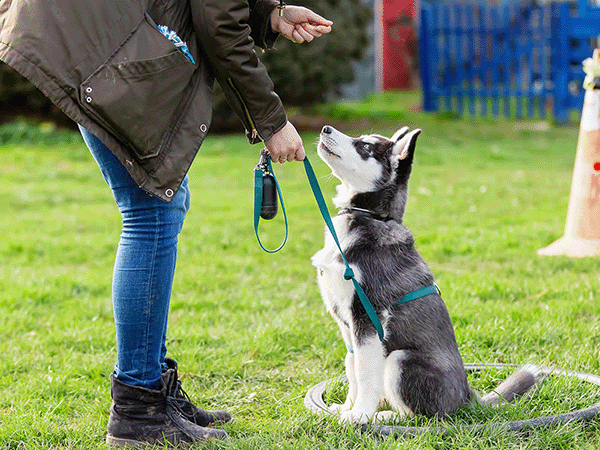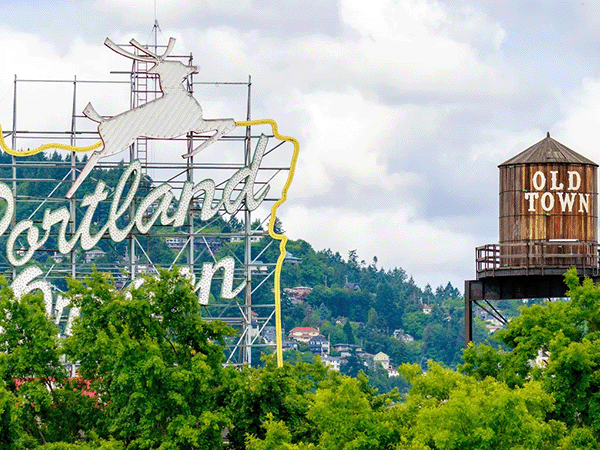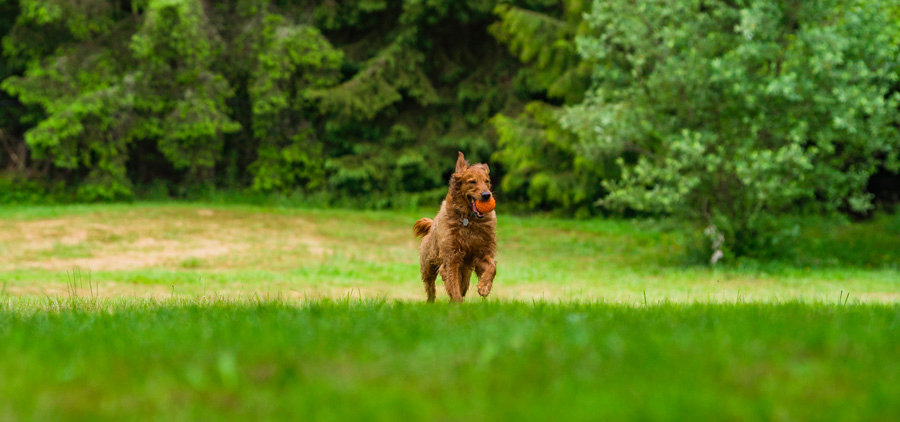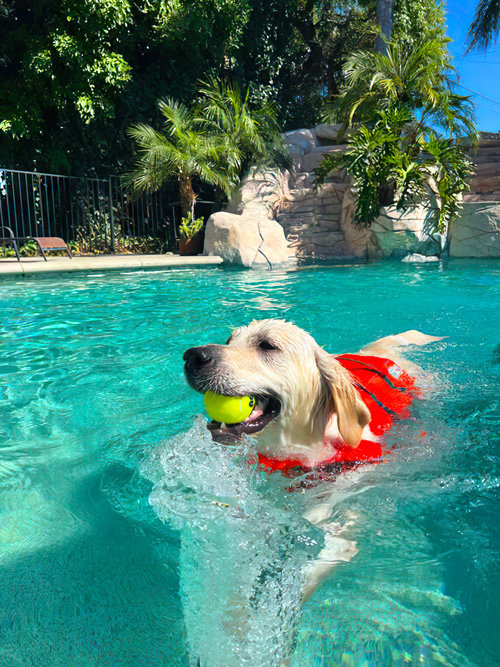How to Get Your Dog to Stop Chewing Everything

* All Sniffspot articles are reviewed by certified trainers for quality, please see bottom of article for details *
Dogs may not be able to actually talk to us, but that doesn’t mean they don’t have their own ways of communicating when something is up. It's our job as pet parents to pay attention when they’re trying to send us a message!
If you’ve noticed that your dog is chewing on things they shouldn’t be, it doesn’t mean that they're being bad or trying to ruin your life (or even to intentionally destroy your belongings). It just means that something else is going on with them — maybe boredom, anxiety, or even pain — that you need to address.
Here’s what you need to know about how to handle a dog who is chewing on all the wrong things. We'll help you solve the problem in no time!
Why do dogs chew? Chewing is a natural canine behavior!
Before you can start to correct any undesirable behavior with your pup, you first need to understand why dogs chew and what might encourage their chewing on household objects. There are several possible reasons your dog is getting their mouth on things you wish they’d leave alone.
Puppies (and many adult dogs) explore the world with their mouths
The first factor to consider when you’re trying to determine why a dog is chewing is their age. For puppies, chewing is incredibly natural! Just like human babies, puppies put things in their mouths when they’re getting to know the world around them. This doesn’t always mean that those things should be in their mouths, of course — but it does mean the chewing isn't necessarily indicative of any underlying issues.
When puppies are 3-4 months of age they start teething — the process of losing their baby teeth (much like how human children do) to make room for their adult teeth. This process can prompt chewing as they try to alleviate the discomfort. Teething can be a difficult process for both dog and owner! Prepare yourself for a lot of chewing — puppies have very sharp teeth — and be ready to redirect from your hands and furniture to acceptable alternatives like designated chew toys. You can learn more about making it through in our puppy training guide here.

Chewing can relieve your dog’s stress
For many adult dogs, excessive chewing can be a sign that something else needs to be addressed. If your older dog is engaging in destructive chewing, it could be an outlet for anxiety, like separation anxiety or fear-related problems.
To determine what’s triggering your dog’s chewing, you’ll want to pay close attention to the circumstances that surround incidents of unwanted chomping.
- Dogs who are suffering from separation anxiety will typically only act out when they’re left alone. If your pup never even needs a gentle reminder not to chew when the humans are around, it could be one of their signs of separation anxiety! You can learn more about dogs who struggle to be away from their people in this article.
- Dogs who chew as a response to anxiety or reactivity may chew more when there’s a trigger present — like a stranger visiting the house or loud noises like construction work or fireworks outside. You can learn more about dog anxiety in this article and dog reactivity in this blog category. Remember that even mild anxiety can display itself as problematic or destructive behaviors.
- Some dogs are drawn to mouth inappropriate items to alleviate discomfort associated with physical pain or medical conditions. A thorough vet check can help rule out this motivation for chewing and confirm your pup's good health status.
Dogs often chew when bored
Dogs also chew when they’re bored. Sometimes chewing can be a way to solicit affection — some pets learn that when they run off with your shoe, you always chase after them, which they might view as a pretty fun game.
Boredom-driven chewing will almost never occur when your dog’s body and mind are thoroughly satisfied. If your dog is chewing on furniture and shoes right after a long walk or trip to the dog park or trick training session or other forms of mental stimulation, boredom probably isn’t the issue.
Paying attention to the cause of your dog’s chewing can help you address it
Whatever your dog's motivation for chewing inappropriately, you should be able to identify the root cause by paying close attention to what’s going on when the unwanted chewing occurs.
And, of course, if you’re struggling to get to the core of the issue, you can always enlist the help of a force free trainer in your area to figure it out!
How to address excessive or destructive chewing
If your dog is engaging in destructive chewing, don’t panic. There are plenty of simple steps you can take to discourage the behavior in the moment and help create new healthy habits in the long run.
Manage your environment — keep off-limits items out of reach
If your dog has been struggling with what to chew and what not to chew, make things easier by picking up any items that should stay firmly on the “no chewing” list and keeping them out of your dog’s reach. After all, they can’t chew what they can’t get to.
(We know this is easier said than done, especially with curious puppies — consider creating a designated "off limits" area on a counter or in a cabinet while you're working through this chewing training with your dog.)
Meet your dog’s basic needs!
Some dogs are more likely to chew when they’re hungry, which is common if your pup is on a calorie-restricted diet. Mouthing is a natural urge often associated with consuming food.
Make sure you provide your pup with daily nutritious meals, fresh water, and regular bathroom breaks at reasonable periods of time (no more than 6-8 hours for an adult dog and shorter intervals for a puppy) to meet their basic needs.
Exercise your dog’s body and mind
One of the most common causes of inappropriate chewing among dogs is boredom. When dogs are bored, they look for ways to amuse themselves — and, in the dog world, chewing is a fantastic source of entertainment. Like we said above, chewing is a normal canine behavior!
By keeping your dog physically tuckered out with plenty of exercise, like walks and fast-paced play (like running in a Sniffspot near you); mentally worn out with things like puzzle toys and scent walks; and secure in their relationship with you through social stimulation, you’ll help curb the urge to chew.
We want to place special emphasis on the importance of mental stimulation alongside physical exercise. Dogs are intelligent, emotional animals who benefit from being able to use their brains alongside their bodies.
You can learn more about dog enrichment in our comprehensive guide!
Provide plenty of opportunities to chew on appropriate items
Because chewing is a natural, instinctive behavior, it can be really satisfying for our dogs. It may sound counterintuitive at first, but one way to address problem chewing is to make sure you give your dog ample chances to chew safe, approved toys (or edibles like bully sticks, kongs with peanut butter, and other enrichment toys). A bonus of this? Appropriate chewing on a variety of objects can maintain your dog's healthy teeth throughout adulthood!
If you're worried about creating confusion here, consider only giving these toys in a specific area of the house or when you say a certain verbal cue. That can help your dog learn when it is and isn't okay to chew to prevent further destructive behaviors..
Create a clear separation between your dog’s toys and other household items
If your dog is having a hard time sticking to their own toys for chewing, make things as easy as possible for them by stocking up on dog toys that are obviously different from the household items you don’t want them chewing (like your favorite shoes).
This can be especially challenging — but important — if your dog lives in a household with human kids who have their own belongings lying around. It's also an opportunity to teach your children about the value in cleaning up after playing!
Supervise your young puppy
Dogs are like kids in that they need constant supervision when they’re young or just learning a new set of rules. If your dog is still getting a handle on what’s appropriate to chew and what isn’t, it will help to have you close by to praise them quickly and consistently when they're chewing on the right things — and to give them replacement chews when their chewing attention is focused on the wrong items during the learning process.
Interrupt inappropriate chewing as soon as you see it
When you do notice that your dog is chewing on something they shouldn’t be, don’t punish them. Instead, just remove the thing your pup shouldn’t be chewing from the area and then have an appropriate chew toy handy to give them as a replacement. When they chomp down on the toy instead of your favorite pair of shoes, be sure to praise them lots to reinforce the positive behavior.
If your pup struggles to let you take items away in return for other appropriate toys, they might be resource guarding. You can learn more about food aggression and related behavior in this article!
Consider using sprays to make chewing on the wrong things less desirable
If your dog is really struggling to kick the habit of chewing on high value items like furniture, consider investing in a taste deterrent spray (like Bitter Apple spray or apple cider vinegar) to make the act of chewing on those items literally leave a bad taste in your dog’s mouth.
But remember, you must supervise your dog really carefully when first trying a taste deterrent. For some dogs, they won’t actually be effective and the chewing will continue on just as strong as before.
Be patient and consistent!
Addressing any undesirable behavior won’t happen overnight — and chewing is no exception. We know this is hard as a pet parent!
If your dog is struggling with chewing on the wrong things, be patient with them and accept that you’re probably going to lose a few items in the process of teaching your pup what to chew and what not to chew. Just remember that your dog and your amazing relationship with them is worth more than any pair of shoes or your favorite phone case.
What not to do when you catch your dog chewing
When you set out to train your dog not to chew on the wrong things, it’s just as important to know what not to do as it is to know what you should be doing. If you catch your dog chewing something they shouldn’t be — whether it’s during the act or after the fact — don’t punish them. That includes verbal punishment like yelling or scolding.
Scolding and other forms of punishment won’t ever help the situation. When applied after the fact (like when you come home from work to find something chewed up in the middle of the living room floor), they only serve to confuse your dog and can actually trigger anxiety and additional undesirable behaviors. If you don’t notice inappropriate chewing as it’s happening, fight the instinct to scold your dog and just ignore it. Go back to your management plan and remember you've got this!
Trainer Reviews of this Article
There is so much misinformation out there, we want to make sure we only provide the highest quality information to our community. We have all of our articles reviewed by qualified, positive-only trainers.
These are the trainers who reviewed this article:
Rachel McMichael
Owner/Founder: UpSwing Total Pet Care - Certified Behavior Consultant Canine (CBCC-KA), IAABC Accredited Dog Trainer (IAABC-ADT),
CATCH Certified Dog Trainer (CCDT), Certified Trick Dog Instructor (CTDI), Certified Animal Reiki Practitioner
Shannon Finch
AnimalKind Training
M.Ed. Humane Education
Karen Pryor Academy Certified Training Partner
Certified Tellington TTouch and TTEAM Practitioner
Most recent articles
Related articles
Top dog guides per area
Dog training guides

Dog Food Aggression: Why You Shouldn't Punish It
Does your dog ever growl when you walk by their food dish? Maybe they get possessive of treats, carrying them far away and giving you side-eye when you start to approach — or snarling at your other pets or children if they get too close.

Best Dog Fields in the US: 25+ Wide-Open Spaces for Your Pup to Run Free
The best dog fields in the US offer something that traditional enclosed parks simply can't match: acres of open space where your pup can truly stretch their legs and run at full speed. From Colorado's 470-acre prairie meadows to Tennessee's award-winning "Outback," these wide-open spaces allow dogs to roam, explore, and exercise naturally while engaging instincts that cramped urban parks suppress.

The Ultimate Guide to Scent Training for Dogs
Your dog's nose is an amazing tool. Did you know they have 40 times the olfactory receptors than humans? Scent training for dogs taps into this superpower, turning everyday moments into exciting sniff-fests. It's enriching for all types of dogs – reactive, shy, or simply adventurous. Ready to explore the world of scent work for dogs? Let's get started.

Service Dog Training Costs: DIY vs. Pro
More than 80 million Americans rely on their service dogs to help them navigate the world. Task-trained assistance animals perform a huge range of life-changing—in many cases, life-saving—services: These dogs act as eyes for visually impaired handlers, provide mobility support, alert to seizures and blood sugar crashes, interrupt anxiety attacks, remind their people to take medications, and so much more.

How to Deal With Puppy Potty Training Regression
You thought those dreaded middle-of-the-night potty breaks were over. You were finally free from cleaning up puppy puddles. Then, suddenly, your furry friend starts having accidents again. It's frustrating, right? This puppy potty training regression is more common than you think. Don't worry; we'll help you get your pup back on track. We'll cover the common causes, offer practical solutions, and give you actionable steps to tackle this challenge together.

Dirty Dog Syndrome: Causes, Solutions, and Prevention
It's a cringe-worthy moment every dog owner dreads: your furry friend chowing down on something truly disgusting. If your dog has a penchant for poop, you're dealing with coprophagia. It's more common than you think, and thankfully, often manageable. This article explores the reasons behind dirty dog syndrome, from instinct to learned behavior. We'll also give you practical tips to help break this unpleasant habit.

How to Train Your Rescue Dog: A Complete Guide
* All Sniffspot articles are reviewed by certified trainers for quality, please see bottom of article for details *
Dog enrichment guides

Best Dog Water Parks in the US: 15+ Amazing Splash Destinations for Your Pup
Do you have a water-loving dog looking to burn some energy? There are countless dog parks to visit throughout our country — but some of them become far too hot in the midday sun to be safe for your pets to play. That’s why we’ve put together a list of some of the best dog water parks throughout the United States! At these locations, your pup can frolic, splash, and swim to their heart’s content.

Best Dog Fields in the US: 25+ Wide-Open Spaces for Your Pup to Run Free
The best dog fields in the US offer something that traditional enclosed parks simply can't match: acres of open space where your pup can truly stretch their legs and run at full speed. From Colorado's 470-acre prairie meadows to Tennessee's award-winning "Outback," these wide-open spaces allow dogs to roam, explore, and exercise naturally while engaging instincts that cramped urban parks suppress.

Best Toys for Herding Dogs: Keeping Your Pup Happy & Engaged
Herding dogs are amazing, intelligent companions. But that also means they need more than just a simple game of fetch. Finding the right toys for herding dogs is key to keeping them happy and stimulated. This article explores some of the best toys for herding dogs, including options specifically for breeds like Border Collies and Australian Shepherds. We'll help you discover the perfect herding toys for dogs to tap into their natural instincts and keep them entertained for hours.

Tough Dog Toys for Aggressive Chewers: A Practical Guide
Does your dog destroy every toy you give them? Is your house littered with the remnants of plush toys? Are you tired of wasting money on "indestructible" dog toys for aggressive chewers that don't last? Then this post is for you. We'll cover everything you need to know about finding the best dog toys for aggressive chewers, so you can finally give your pup something safe, durable, and fun.

Daily Exercise Calculator: How Much Exercise Does Your Dog Need?
Everyone knows dogs need exercise, but how much is enough? Walks are great, but creating a truly balanced fitness plan means understanding your dog's specific needs. This post helps you develop a daily exercise calculator for your dog, considering breed, age, and lifestyle. We'll cover fun activities, understanding exercise intensity, and recognizing when your pup has had enough. Let's create a plan that keeps your dog happy and healthy!

Complete Guide To Herding With Dogs
* All Sniffspot articles are reviewed by certified trainers for quality, please see bottom of article for details *

Dog Enrichment Activities: The Ultimate Guide
Ever feel like your dog is restless or bored? They may be getting enough exercise, but still need more. That's where enrichment activities for dogs come in. Giving your dog opportunities to sniff, explore, and problem-solve can make a world of difference. Whether you have a puppy, adult, or senior dog, enriching their environment is key for their well-being. Let's explore how to add cognitive enrichment for dogs, even tailoring activities to your dog's breed with breed specific enrichment and fun enrichment games for dogs.
Dog reactivity guides

Rottweiler Aggression: Truth vs. Myth
Many dogs have gotten a bad reputation over the years for being "dangerous breeds." Rottweilers are among them. Like pit bulls and other large, blocky-headed types of dogs, these powerful and beautiful animals are often assumed to be aggressive.

Best Dog Fields in the US: 25+ Wide-Open Spaces for Your Pup to Run Free
The best dog fields in the US offer something that traditional enclosed parks simply can't match: acres of open space where your pup can truly stretch their legs and run at full speed. From Colorado's 470-acre prairie meadows to Tennessee's award-winning "Outback," these wide-open spaces allow dogs to roam, explore, and exercise naturally while engaging instincts that cramped urban parks suppress.

What Is a Reactive Dog? A Practical Guide for Owners
Does your dog suddenly transform into a barking, lunging Tasmanian devil on walks? It's stressful for both of you. If this sounds familiar, you might have a reactive dog. Understanding what is a reactive dog is the first step to calmer walks. We'll explore the common triggers and give you actionable strategies to manage and modify this behavior. Let's turn those stressful walks into enjoyable outings.

How to Socialize a Reactive Dog: A Step-by-Step Guide
Does your dog display reactivity to other pets or people? Maybe they’re a new rescue pup and are still settling into your home. Or they were sick growing up, so you missed their critical socialization period. Possibly they’ve had a bad experience after being raised as a normal puppy.

What Is a Reactive Dog? A Complete Guide
Is your dog overly excited or fearful around other dogs? Do they bark, lunge, or whine? You might have a reactive dog. Many dog owners face this challenge. Understanding what a reactive dog is is the first step to helping them. This guide explores the common causes of dog reactivity, explains what makes a dog reactive, and offers practical tips and resources. Let's work together to build a stronger bond with your dog and enjoy stress-free walks.

9 Best Online Communities for Reactive Dog Parents
Does your dog's reactivity make walks stressful? You're not alone. Many dog owners face similar challenges. This guide offers practical advice and support for managing reactivity, including finding the best online dog training for reactive dogs. We'll connect you with reactive dog support groups, share training tips, and explore resources like the best dog training app for reactive dogs. Let's build a stronger bond with your dog, together.
* All Sniffspot articles are reviewed by certified trainers for quality, please see bottom of article for details *
How To Groom a Reactive Dog
* All Sniffspot articles are reviewed by certified trainers for quality, please see bottom of article for details *
Sniffspot community guides

The State of Public Dog Parks Across the United States
From 2009 to 2020, there was a 40 percent increase in the development of public dog parks. Designated spots for canine exercise have become commonplace in every major city in North America — many pet owners won’t even consider renting an apartment that doesn’t have its own fenced-in pet area for their canine companions.

Best Dog Fields in the US: 25+ Wide-Open Spaces for Your Pup to Run Free
The best dog fields in the US offer something that traditional enclosed parks simply can't match: acres of open space where your pup can truly stretch their legs and run at full speed. From Colorado's 470-acre prairie meadows to Tennessee's award-winning "Outback," these wide-open spaces allow dogs to roam, explore, and exercise naturally while engaging instincts that cramped urban parks suppress.

How This Family is Affording Their Dream Property Through Renting it Hourly to Dogs
Thousand Oaks, California has been a safe haven for Sniffspot host, Jen, since childhood. Having grown up in busy Santa Barbara, Jen, an introvert from an early age, would seek out solitude and serenity away from tourists attractions and droves of people visiting from elsewhere. “My grandparents own 60 acres about a 30 minute drive from here, and I grew up spending every summer and every holiday visiting them on the ranch,” Jen explained. “In Santa Barbara, we wouldn't go to the beach on the weekend because that's where everybody was, so you'd find places off the beaten path where the tourists weren't. For me, the ranch was just my happy place.”

Host Tips: Ellen K. What Makes Sniffspot Successful for Me
Ellen is the host of Country Pasture Getaway, one of Sniffspot's most popular sniff spots. She has taken the time to write up the lessons she has learned about how to be a great sniff spot host.

How this Oregon Farmer is Making a Business From Renting Her Land to Dogs
Just 20 minutes outside of the busy city of Portland, Oregon, and settled right on the banks of the Columbia River, you’ll find what countless visitors have flocked to the area in search of – mountain views, crisp, clean air, and running water for miles. What you might not expect to find, however, is a hidden oasis designed just for dogs and their people, owned and operated by a farming couple and enjoyed by visitors on two legs, and four.

Host Tips: Fran T. Providing Great Guest Service at our Spot
Fran is the host of Ranch Setting, one of Sniffspot's most popular spots. She has taken the time to write up the lessons she has learned about how to be a great Sniffspot host.

How Sniffspot Helped a Nervous Rescue Work Through His Fears and Change His Family’s Life
This is the story of a family and dog rescuing each other.
Top dog trainers in the US

The Best Dog Trainers in the United States of 2026
This is a list of the top dog trainers in the United States, based on votes from the Sniffspot community and the general public.
The Best Dog Trainers in Seattle, WA of 2026
This is a list of the top dog trainers in Seattle, WA, based on votes from the Sniffspot community and the general public.
The Best Dog Trainers in Portland, OR of 2026
This is a list of the top dog trainers in Portland, OR, based on votes from the Sniffspot community and the general public.
The Best Dog Trainers in Los Angeles, CA of 2026
This is a list of the top dog trainers in Los Angeles, CA, based on votes from the Sniffspot community and the general public.
The Best Dog Trainers in New York, NY of 2026
This is a list of the top dog trainers in New York, NY, based on votes from the Sniffspot community and the general public.
City dog parks guides

Top 10 Indoor Dog Parks: A US Guide
Looking for a space to play with your dog no matter what the weather’s like outside? Look no further than our list of the best indoor dog parks in the United States! These climate-controlled spaces are growing in popularity as pet ownership increases throughout the country. As a bonus, many of them also offer dog training, boarding, grooming, or daycare services on the premises.

Best Dog Fields in the US: 25+ Wide-Open Spaces for Your Pup to Run Free
The best dog fields in the US offer something that traditional enclosed parks simply can't match: acres of open space where your pup can truly stretch their legs and run at full speed. From Colorado's 470-acre prairie meadows to Tennessee's award-winning "Outback," these wide-open spaces allow dogs to roam, explore, and exercise naturally while engaging instincts that cramped urban parks suppress.

Best Dog Parks in the US: Ultimate Guide to Public & Private Off-Leash Adventures
Is your pup giving you those pleading "let me run free" eyes? Whether you're a new dog parent or a seasoned pro looking for fresh adventures, finding the perfect off-leash paradise for your furry friend can feel ruff! From sun-soaked California beaches where your water-loving lab can make a splash to mountain trails in Vermont where your adventure buddy can chase every scent, we've sniffed out the 15 best dog parks across America.

Dog Parks Near Me: Las Vegas Edition
Looking for the perfect dog park near me in Las Vegas? You're in luck! This guide explores all the best options for your pup, from public dog parks to private dog parks near me on Sniffspot. We'll help you find the ideal spot for playtime, socializing, and fresh air. Plus, we'll cover essential etiquette and safety tips to ensure a happy visit for everyone. Get ready for some tail-wagging fun!

Top Sniffspot Locations: Find the Perfect Dog Park
Looking for the perfect dog park? Whether you need a wide-open public space or a private, fenced-in spot, this guide will help you find the best dog parks across the US. We'll cover top-rated public parks, the perks of private dog parks, and even explore Sniffspot locations – giving your pup a safe and fun place to play. Ready to find your dog's new favorite spot? Let's go!

Sniffspot: Portland's Best Private Dog Parks
Ready to discover Portland's best dog parks? Whether you're looking for a public park or the unique experience of a private Sniffspot, this guide has you covered. We'll help you find the perfect spot for your pup, with tips on what to bring, how to prepare, and even understanding dog body language. Plus, we'll explore some top Portland dog parks, including public and Sniffspot options, so you can plan your next dog-friendly adventure in the City of Roses.
Portland Dog Parks: Public & Private Options
This page is about public city dog parks and also includes Sniffspot private dog parks. Sniffspot is the largest network of private dog parks for rent in the world!
Small Dog Park Guide: Tips for Finding the Perfect Spot
Finding the perfect dog park for your small breed can be ruff! Big dog parks can be overwhelming, even dangerous, for little pups. This comprehensive guide helps you sniff out the best small dog parks for your pint-sized companion, covering everything from essential safety checklists to top recommendations for small dog parks across the US—including both public spots and private dog parks.
Dogs breeds

German Shepherd Guide: Best Family Dog? Truth from 9K Owners
The German Shepherd Dog (GSDs) are known for their intelligence, loyalty, and striking appearance. They're also incredibly versatile, excelling as working dogs and devoted family companions. This guide covers everything you need to know about GSDs, from understanding their unique traits and rich history to practical advice on training and care. So, whether you're a seasoned GSD owner or just starting your research, let's explore this remarkable breed together.

Best Dog Fields in the US: 25+ Wide-Open Spaces for Your Pup to Run Free
The best dog fields in the US offer something that traditional enclosed parks simply can't match: acres of open space where your pup can truly stretch their legs and run at full speed. From Colorado's 470-acre prairie meadows to Tennessee's award-winning "Outback," these wide-open spaces allow dogs to roam, explore, and exercise naturally while engaging instincts that cramped urban parks suppress.

Labrador Retriever: America's Best Family Dog? Owner Truth
Discover the Labrador Retriever, a breed celebrated for its playful nature, affectionate temperament, and trainability. Labradors are known for their friendly demeanor and adaptability, making them perfect family companions and versatile working dogs. As one of the most popular types of retrievers, Labs are ideal companions for various lifestyles and are recognized by the American Kennel Club (AKC) as an excellent breed for families.

Golden Retriever Advice: The Complete Owner's Guide
Golden Retrievers: they're gorgeous, playful, and incredibly popular. But before you welcome one into your home, you need the right golden retriever advice. This guide draws on the wisdom of nearly 10,000 Golden Retriever owners, offering practical tips for caring for these affectionate dogs. From understanding their high energy levels to mastering grooming and training, we'll cover everything you need to know. So whether you're already a devoted Golden parent or just starting your research, get ready to learn how to give your furry friend the best possible care.

Are American Staffordshire Terriers Good for First-Time Owners: Complete Guide
Think American Staffordshire Terriers are tough? Think again. While their muscular build might intimidate some, these dogs are known for their playful and loyal personalities. This guide draws on the experience of nearly 10,000 AmStaff owners to reveal the truth about this often misunderstood breed. Want to learn more about caring for an American Staffordshire Terrier? You're in the right place.

Australian Shepherd Facts: Breed Info & Care Guide
Discover the Australian Shepherd, an AKC breed celebrated for its trainable, playful, and affectionate nature. Despite its name, the Australian Shepherd is actually a native breed to the United States, originally developed to breed on farms and ranches. Considered a medium dog, Australian Shepherds were bred for herding beginning in the 1950s. As one of the high-energy breeds, Aussies are known for their boundless energy and need for regular exercise, including aerobic exercise.

Essential Husky Facts for Owners: Breed Guide
Discover the Siberian Husky, a breed celebrated for its curious, intelligent, and loyal nature. Considered a medium-sized dog, Siberian Huskies were originally bred in Russia for sledding, beginning in the early 20th Century. Today, they're one of the most popular active breeds in North America.




























